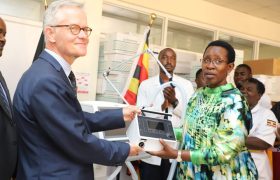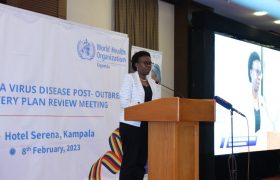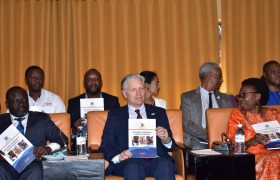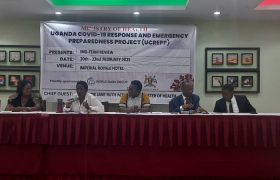Kampala, 6th -February -2023; The Federal Government of Germany and the free state of Saxony has donated medical equipment worth 160,000 Euros to Kiruddu National Referral Hospital with the aim of improving Health services in Uganda especially in the Intensive Care Unit (ICU).
The equipment donated included 10 ventilators and their accessories were handed over to the Permanent Secretary Ministry of Health, Dr. Diana Atwine by the German Ambassador to Uganda Mathias Schauer in the presence of senior management of Kiruddu Hospital.
Dr. Diana Atwine said, “these machines are going to transform lives and help in increasing the number of patients that have been admitted in ICU. These machines being few limits the number of patients admitted in ICU at a time.”
However, she called upon other hospitals to be friendly, and build strong relationships with other countries to enable Uganda fight global threats like antimicrobial resistance. According to Dr. Charles Kabugo the Director of Kiruddu hospital, through different collaborations Kiruddu NRH has been able to deepen its relations with Uganda. Seven people from Uganda visited a hospital in Germany and it’s ICU which benefited Kiruddu NRH. This strengthened the relationship which yielded gains such as acquiring the necessary equipment, support and strengthening the relationship between Germany and Uganda on the healthcare front.
“Ventilators are life support machines that take over the breathing process by pumping air into the lungs and it is mostly useful for patients with breathing difficulties and severe critical conditions.” Said Dr. Kabugo.
The German ambassador to Uganda Mathias Schauer said, “The donation of ventilators is a joint action of the Federal Government and the free state of Saxony which will considerably improve intensive medical care at the hospital.”
Stephen Mubiru, Uganda’s ambassador to Germany said, the government of Uganda has a close relationship with the government of the federal republic of Germany. This cooperation has led to Uganda developing even closer relations with federal states like Saxony. Our cooperation with Saxony is focused among things on supporting the health sector. “We are grateful that this cooperation has brought tangible benefits to the people of Uganda as we can see today,” he added.
He added that the machines are expected to work reliably and there are hopes of getting more machines as this collaboration gets further strengthened.
By Catherine Nakabugo.




